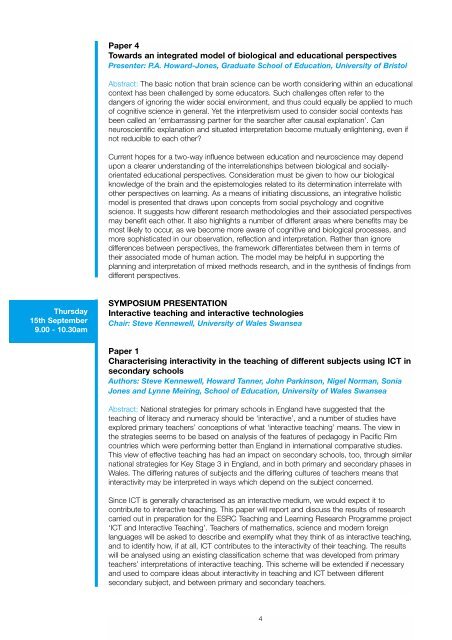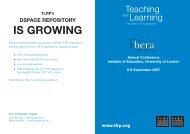Bera Booklet 2005 - Teaching and Learning Research Programme
Bera Booklet 2005 - Teaching and Learning Research Programme
Bera Booklet 2005 - Teaching and Learning Research Programme
- No tags were found...
Create successful ePaper yourself
Turn your PDF publications into a flip-book with our unique Google optimized e-Paper software.
Paper 4Towards an integrated model of biological <strong>and</strong> educational perspectivesPresenter: P.A. Howard-Jones, Graduate School of Education, University of BristolAbstract: The basic notion that brain science can be worth considering within an educationalcontext has been challenged by some educators. Such challenges often refer to thedangers of ignoring the wider social environment, <strong>and</strong> thus could equally be applied to muchof cognitive science in general. Yet the interpretivism used to consider social contexts hasbeen called an ‘embarrassing partner for the searcher after causal explanation’. Canneuroscientific explanation <strong>and</strong> situated interpretation become mutually enlightening, even ifnot reducible to each other?Current hopes for a two-way influence between education <strong>and</strong> neuroscience may dependupon a clearer underst<strong>and</strong>ing of the interrelationships between biological <strong>and</strong> sociallyorientatededucational perspectives. Consideration must be given to how our biologicalknowledge of the brain <strong>and</strong> the epistemologies related to its determination interrelate withother perspectives on learning. As a means of initiating discussions, an integrative holisticmodel is presented that draws upon concepts from social psychology <strong>and</strong> cognitivescience. It suggests how different research methodologies <strong>and</strong> their associated perspectivesmay benefit each other. It also highlights a number of different areas where benefits may bemost likely to occur, as we become more aware of cognitive <strong>and</strong> biological processes, <strong>and</strong>more sophisticated in our observation, reflection <strong>and</strong> interpretation. Rather than ignoredifferences between perspectives, the framework differentiates between them in terms oftheir associated mode of human action. The model may be helpful in supporting theplanning <strong>and</strong> interpretation of mixed methods research, <strong>and</strong> in the synthesis of findings fromdifferent perspectives.Thursday15th September9.00 - 10.30amSYMPOSIUM PRESENTATIONInteractive teaching <strong>and</strong> interactive technologiesChair: Steve Kennewell, University of Wales SwanseaPaper 1Characterising interactivity in the teaching of different subjects using ICT insecondary schoolsAuthors: Steve Kennewell, Howard Tanner, John Parkinson, Nigel Norman, SoniaJones <strong>and</strong> Lynne Meiring, School of Education, University of Wales SwanseaAbstract: National strategies for primary schools in Engl<strong>and</strong> have suggested that theteaching of literacy <strong>and</strong> numeracy should be ‘interactive’, <strong>and</strong> a number of studies haveexplored primary teachers’ conceptions of what ‘interactive teaching’ means. The view inthe strategies seems to be based on analysis of the features of pedagogy in Pacific Rimcountries which were performing better than Engl<strong>and</strong> in international comparative studies.This view of effective teaching has had an impact on secondary schools, too, through similarnational strategies for Key Stage 3 in Engl<strong>and</strong>, <strong>and</strong> in both primary <strong>and</strong> secondary phases inWales. The differing natures of subjects <strong>and</strong> the differing cultures of teachers means thatinteractivity may be interpreted in ways which depend on the subject concerned.Since ICT is generally characterised as an interactive medium, we would expect it tocontribute to interactive teaching. This paper will report <strong>and</strong> discuss the results of researchcarried out in preparation for the ESRC <strong>Teaching</strong> <strong>and</strong> <strong>Learning</strong> <strong>Research</strong> <strong>Programme</strong> project‘ICT <strong>and</strong> Interactive <strong>Teaching</strong>’. Teachers of mathematics, science <strong>and</strong> modern foreignlanguages will be asked to describe <strong>and</strong> exemplify what they think of as interactive teaching,<strong>and</strong> to identify how, if at all, ICT contributes to the interactivity of their teaching. The resultswill be analysed using an existing classification scheme that was developed from primaryteachers’ interpretations of interactive teaching. This scheme will be extended if necessary<strong>and</strong> used to compare ideas about interactivity in teaching <strong>and</strong> ICT between differentsecondary subject, <strong>and</strong> between primary <strong>and</strong> secondary teachers.4
















